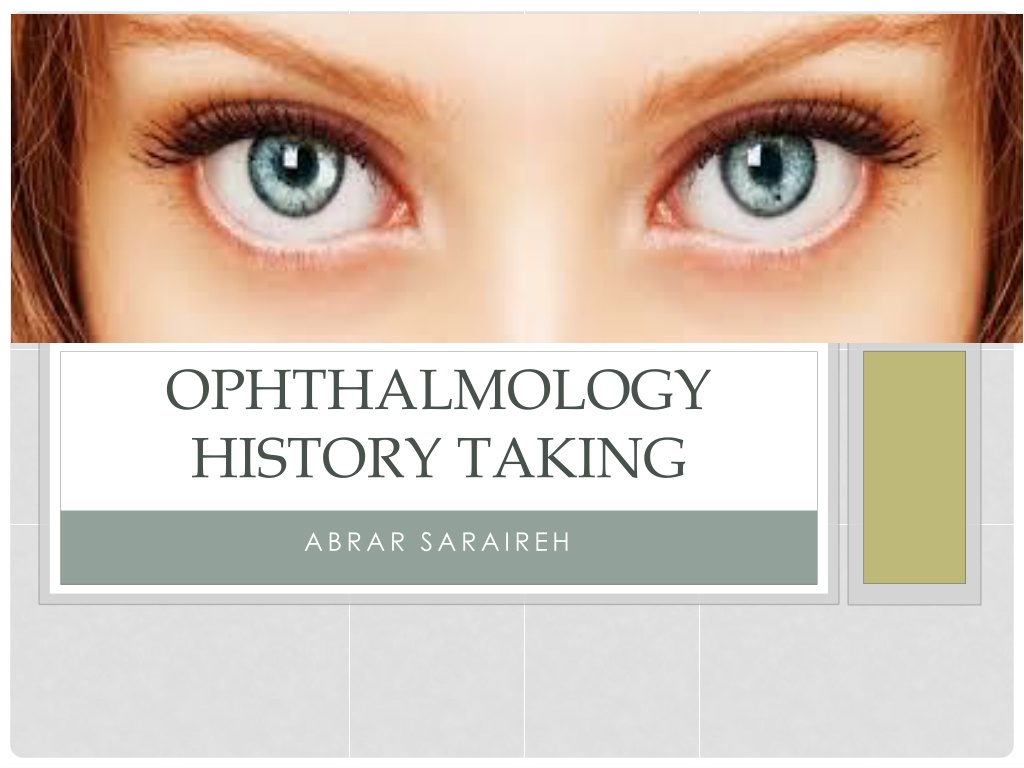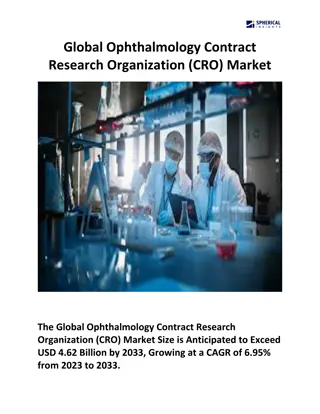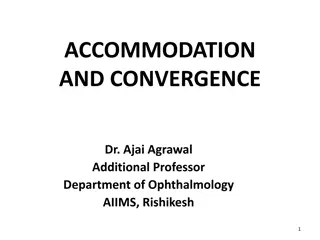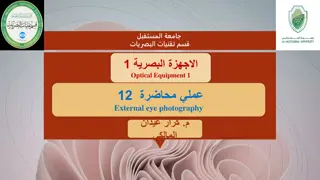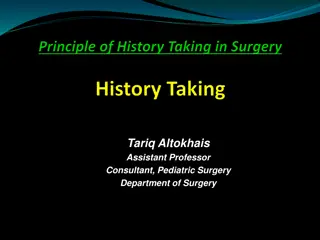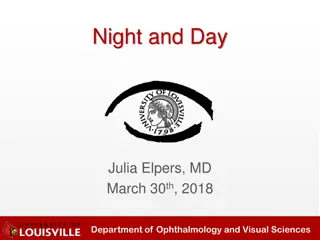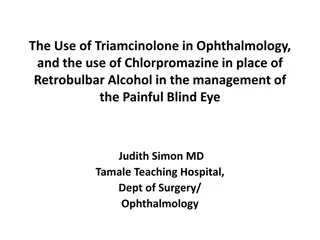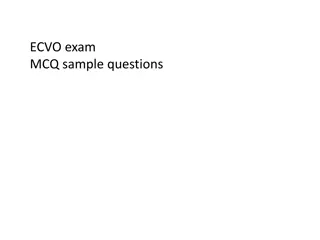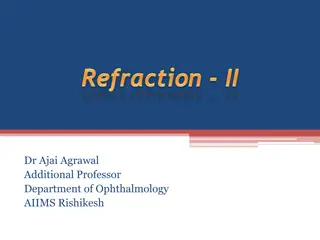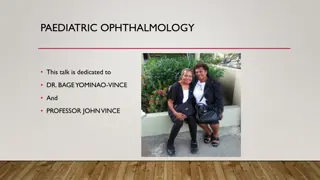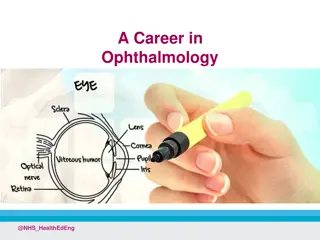Ophthalmology History Taking: Importance and Components
Ophthalmology history taking is crucial for identifying and narrowing down differential diagnoses, screening for hidden diseases, and protecting patients from harm. Components include patient profile, chief complaint, history of present illness, past ophthalmic and medical history, drug and family history, social history, and allergies. Chief complaints commonly include blurred vision, red eye, eye pain, itching, and lacrimation. Specific questioning about blurred vision can help determine causes such as refractive errors or organic eye problems. Other symptoms like red eye require further investigation into pain, vision changes, trauma, itchiness, discharge, and recent exposures.
Download Presentation

Please find below an Image/Link to download the presentation.
The content on the website is provided AS IS for your information and personal use only. It may not be sold, licensed, or shared on other websites without obtaining consent from the author. Download presentation by click this link. If you encounter any issues during the download, it is possible that the publisher has removed the file from their server.
E N D
Presentation Transcript
OPHTHALMOLOGY HISTORY TAKING ABRAR SARAIREH
IMPORTANCE OF GOOD HISTORY Focuses your attention to the patients problem Narrows down your deferential diagnosis Screen the patient for other disease, the patient might not be aware of. Protect other people from harmful events inflected on others, because of the patients problem.
HISTORY COMPONENTS patient Profile Chief complaint History of present illness Past ophthalmic history Past medical history Drug history Family history Social history Allergies
o Name of the patient oAge oSex oResidence oWork
CHIEF COMPLAINT Main symptoms 1- blurred of vision 2- red eye 3- eye pain 4- itching 5- lacrimation .
BLURRED OF VISION When the patient present with a change in vision ask about : - Did the change in vision start suddenly or gradually? -How is the vision affected exactly? ( is it loss of vision? Cloudy vision? Floaters? ) -Unilateral or bilateral? -Whole or part of the visual field affected? -If partial, which part of the visual field affected
BLURRING OF VISION Causes : 1- refractory error 2- Organic problem in the eye (cornea, lens, retina, vitreous, optic nerve disease)
BLURRED VISION Closed angle glaucoma endophthalmitis Keratitis Uveitis Optic neuritis!!
BLURRED VISION Macular edema Retinal detachment Retinal hemorrhage Retinal artery occlusion Retinal vein occlusion
RED EYE ASK : If the eye is painful or photophobia ? If vision is affected ? Any recent trauma ? Eye is itchy ? Whether there is any discharge ? Recent contact lens wear or foreign body exposure ?
OCULAR PAIN Site of pain Severity Aggravating factors Relieving factors Radiation Associated symptoms, Nausea, vomiting, fever, weakness, headache. History of associated trauma
EYE ITCHING Dryness Eye allergy Contact dermatitis Eyelid mass (sclerosing basal cell carcinoma) Blepharitis
PHOTOPHOBIA Corneal symptoms : corneal abrasion , corneal ulcer Uveitis with or without high intra-ocular pressure Herpetic uveitis , Toxoplasmosis HLA-B27 uveitis: ankylosing spondylitis, inflammatory bowel disease, psoriasis and Reiter's syndrome Headache , Migraine (classical and common)
FLOATERS The sense of swimming flies or amorphous organism in space that are no sticking to one side of visual field, typically floaters change position with eye movement Uveitis Vitreous detachment
LACRIMATION AND DISCHARGE - Is the discharge clear or opaque? - Associated pain? Foreign body sensation? Itchiness? - Other symptoms (red eye)?
PAST MEDICAL HISTORY History of D.M , Dyslipidemia , HT: ask about duration, control, complication, medications ( type and compliance) Congenital diseases ( bleeding disorders) Drug allergies History of uveitis or any medical eye problems.
DRUG HISTORY - Insulin - HTN treatment - Chloroquine > Retinal toxicity - Isoniazid - Steroids > ( Acute : Glaucoma , Chronic Use : cataract )
SOCIAL HISTORY o Smoking and alcohol use: this may affect vascular and optic nerve function within the eye. o Occupation: - certain occupations are more likely to get injured in the eye more than others. - certain professions, including drivers of heavy goods and pilots, require specific visual acuity criteria. Visual impairment has a wide range of effects on daily life. Ask about: o Daily activities requiring good vision: reading, television, sport, hobbies and so on. o Driving.
PAST SURGICAL HISTORY Previous surgeries Previous use of eye glasses Previous eye injections . Previous laser to the eye.
